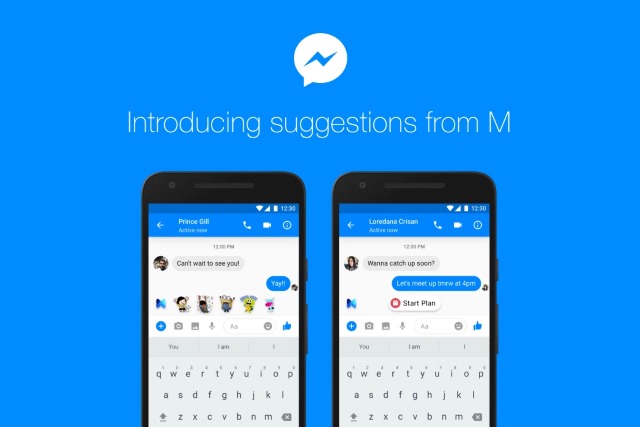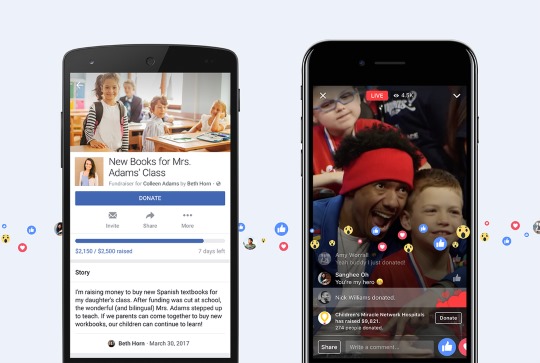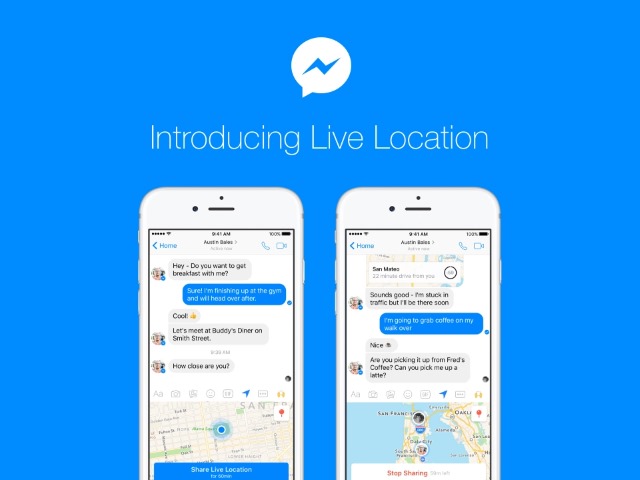
Facebook's AI assistant, M, now offers suggestions in Messenger
Promising to "make your Messenger experience more useful, seamless and delightful," Facebook has launched suggestions from M to everyone in the US. M is the social network's AI assistant, and iOS and Android users can now benefit from behavior-based suggestions for content and actions as the assistant analyses conversations.
What this means in practice is that M might notice that you are chatting with a friend about sending them some money for something. Rather than waiting until you meet them in person, M will spring into action and suggest that you might like to send the money through Messenger. Other possible suggestions relate to Uber and Lyft, stickers, polls and locations.

Microsoft, Google, Twitter and Facebook to work with UK government to tackle extremist content
Following UK home secretary Amber Rudd's suggestion that encrypted messaging service WhatsApp was 'a secret place to hide' for terrorists, four major technology companies met with the minister to discuss the removal of extremist material from websites and social media.
Microsoft, Google, Twitter and Facebook met with Rudd amid calls from civil liberties groups for greater transparency. Following the meeting, senior executives from each company signed a statement indicating that they are ready to work with the government to tackle the problem. The matter of backdoors into encrypted apps and services, however, remained off the table.

Facebook introduces 'personal fundraisers' so you can raise money for yourself
If you need money for something, you might think about using a service such as GoFundMe to ask people to donate cash to you. But now you can turn to Facebook instead, as the social network launches a new "personal fundraiser" feature, as well as Donate buttons in Facebook Live for Pages.
As the name suggests, a personal fundraiser is a way for individuals to raise money for themselves -- or someone they know. To start with, Facebook says that it is only possible to raise money for "critical financial needs" that fall under one of six headings, but this may expand over time. So how do you go about looking for donations through the social network?

Facebook Messenger now lets you share your location for an hour at a time
Facebook is introducing a new feature to its Messenger app for iOS and Android that makes it possible to share your current location with contacts. It is also possible to share other static locations to enable you to point out places on a map.
With Facebook and location-sharing mentioned in the same sentence, there will be obvious concerns about privacy. To try to allay these fears, the current location is only shared for a maximum of an hour, and can be manually stopped at any time before the countdown reaches zero.

Facebook Messenger borrows from Slack with Reactions and mentions
Facebook is not shy about stealing features from other messaging tools, and it's usually Snapchat that is used as inspiration. With the latest update to Facebook Messenger, it's Slack that is being borrowed from.
Today Facebook Messenger gets two new features: Reactions and mentions. These work in very much the way you would expect, and Reactions make a successful transition from the Facebook newsfeed to Messenger after having made a brief appearance to a testing group recently.

Now you can broadcast live to Facebook from your desktop or your favorite games
Facebook Live has been with us for a little while now, but it has been limited by the fact that it has only been possible to broadcast from mobile devices. Today this changes as Facebook opens up broadcasting to desktop and laptop users too.
On top of this, Facebook is adding the ability to stream from other software or external hardware. This has many uses, but the social network suggests that gamers might like to use it to broadcast their gaming sessions live online.

Facebook, Google and Twitter could face EU legal action for unfair terms and conditions, and failing to tackle scams
Having expressed concerned about privacy in Windows 10 and the scanning of Yahoo emails, the European Commission is now turning its attention to Facebook, Google+ and Twitter. The commission is concerned about a rising number of complaints from people who have fallen victim to scams on social media, and being subjected to terms and conditions that are incompatible with European law.
Having already written to the three companies back in November, the European Commission, along with EU consumer authorities, met to discuss how they will move forward. The commission says that if the proposals are unsatisfactory, "enforcement action" may be required.

Pakistan risks privacy concerns by asking Facebook and Twitter to identify users suspected of blasphemy
Pakistan is seeking help from Facebook and Twitter to help execute its incredibly strict blasphemy laws. Anyone found guilty of insulting the Prophet Muhammed, or Islam in general, risks being sentenced to death, and the country is keen to track down offenders both at home and abroad.
The two social networks have only been asked to identify Pakistanis, but the move is likely to raise concerns about privacy. Of equal concern will be not only what is deemed to be blasphemous, but who makes that judgement -- particularly when Pakistan is seeking to identify offenders in other countries.

Facebook bans devs from creating surveillance tools with user data
Without a hint of irony, Facebook has told developers that they may not use data from Instagram and Facebook in surveillance tools.
The social network says that the practice has long been a contravention of its policies, but it is now tidying up and clarifying the wording of its developer policies. American Civil Liberties Union, Color of Change and the Center for Media Justice put pressure on Facebook after it transpired that data from users' feeds was being gathered and sold on to law enforcement agencies.

Worldwide web inventor Tim Berners-Lee's biggest concerns: privacy, fake news and political ads
It was 28 years ago that Tim-Berners-Lee submitted his proposal for the worldwide web. What he envisioned as an open platform that would break down global barriers has become a wild beast with endless problems. Talking on the anniversary of his invention, Berners-Lee has spoken about his concerns for the web.
He has three problems in his crosshairs, and he says the trio of issues is something "we must tackle in order for the web to fulfil its true potential as a tool that serves all of humanity." But he does not come armed with solutions; it's at least partly down to us to sort things out.

Major League Soccer comes to Facebook Live
Soccer is a very popular sport globally, especially in places like Europe and South America. With that said, it is not a huge deal in the United States. True, there are fans of the sport in the USA, but its popularity comes nowhere near, say, baseball, basketball, or football. Unfortunately, this means that many televised matches do not reach all markets. Heck, some matches don't even get broadcast in the English language!
If you are a fan of professional soccer in the USA, however, I have some very good news for you. Some Major League Soccer matches will soon be broadcast on Facebook Live. These are games that would have only been broadcast on TV in Spanish, but will now get the English treatment on the social network. In other words, English-speaking soccer fans are getting increased access to the sport.

Take care with Facebook Lite -- it could be stealing your data and installing malicious apps
It's no secret that Facebook can be a real hog, both in terms of data and battery usage. To combat the problem, Facebook released a cut-down version of its mobile app in certain markets called Facebook Lite; it also followed that up more recently with Facebook Messenger Lite.
The problem with Facebook Lite is that it's not available everywhere through Google Play. For people keen to get their hands on the app, there are plenty of app repositories online offering it for download. But not all repositories are equal, and some are serving up a tainted version of Facebook Lite that's laden down with spyware -- specifically Android/Trojan.Spy.FakePlay.

Facebook asks BBC for sexual images found in Facebook groups; calls police when BBC complies
Facebook, like just about any other social network -- and, indeed, countless websites -- is home to all manner of objectionable and even illegal content. A BBC investigation found that Facebook was failing to remove sexualized images of children from groups after they were reported, calling into question Facebook's moderating procedures. Accounts for convicted pedophiles also remained online after they were reported.
When the BBC pointed out to Facebook that less than 20 percent of the reported images were removed, Facebook asked to see the images that were being investigated. When the BBC complied with the request, Facebook reported the corporation to the police for distributing illegal images. The social network's response to the investigation has been derided as "extraordinary".

Facebook rolls out a Disputed label to help weed out fake news -- albeit weakly
Donald Trump may have turned the idea of fake news into something of a joke, but there is a serious problem with fabricated stories on Facebook. Conscious of the potential for not only ad revenue through clicks, but also the ability to mould the news narrative, money-seekers and those with a (usually political) agenda have become skilled in flooding the social network with sensational, scary stories that are simply not true.
Mark Zuckerberg has already talked about his desire to drive the scourge of fake news from his site, and now we can see this plan in action. It's not quite on the scale of Google's fact checking regime, but the social network will now flag up potential fake news with a Disputed label, and also provide links to sites that question the veracity of the stories in question.

Facebook is finally getting a Dislike button... in Messenger
Facebook is famous for its Like button, but there have been calls for the exact opposite for many years. People have been clamoring for a Dislike button for a long time, but the closest we've got so far is Reactions -- which at least give the option of responding negatively to something... even if it doesn't make any difference in the long run.
Now Reactions are expanding beyond the main Facebook site and appearing within Messenger. This gives users the opportunity to respond to messages -- just as they can to posts -- with a quick emoji from a pre-populated list. Best of all? There's a Dislike option!
